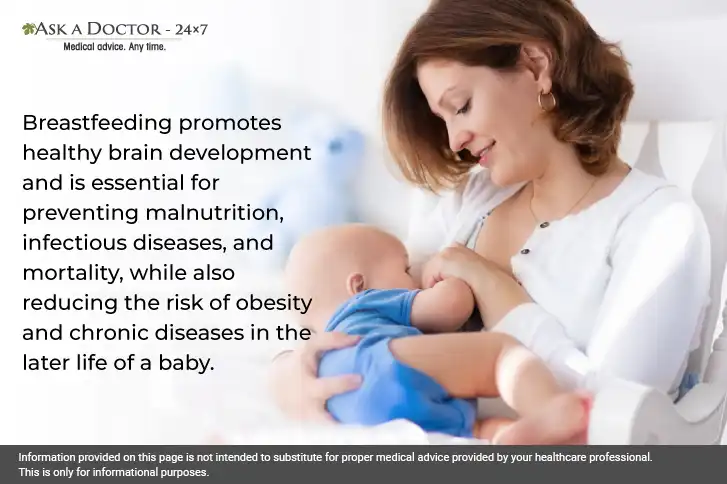Valuable Breastfeeding Tips For Beginners With 3' Ps And 5' Rules
Breast milk is a blessing for both mother and baby as it provides complete infant nutrition and prevents illnesses. Various research and studies have also proven repetitively that babies who are not fed on breastmilk are comparatively prone to have more infections and allergies than breastfed babies. Also, a mother who breastfeeds is found to have a lesser risk of developing deadly diseases like ovarian and breast cancer, or osteoporosis compared to formula-feeding mothers. Additionally, breastfeeding helps with postpartum weight loss, delays fertility, increases a mother’s self-confidence, and promotes bonding. Therefore, all the would-be moms or new moms must choose to breastfeed their babies.
Easy said than done! Therefore, this blog has jotted down some valuable breastfeeding tips for beginner mommies – with a detailed explanation of the 3Ps and 5 Rules of Breastfeeding. Read on to get ready for a wonderful nurturing experience…
Understand the 3 P's of Breastfeeding

To make the new mommies feel relaxed and hassle-free while feeding their newborns, we have discussed below 3 effective thumb rules of breastfeeding:
1. Practice
Breastfeeding is not a skill that someone is born with, instead a new thing for both mother and baby too. Therefore, a mother needs to calmly practice breastfeeding and it will get gradually easier with time. Remember a mother equally needs to be supported by her better half and family, especially in the initial stage of breastfeeding.
2. Patience
Remember, if any mother becomes frazzled and stressed while breastfeeding, a baby will sense and catch her emotions and s/he will also get discomfort and stress. Therefore at this time, a mommy needs to keep patience and practice. Just remember you are both learning together.
3. Persistence
In the initial time, it could be a little challenging but yes of course it would get easier and easier day by day with practice. All you need to do is to be consistent. And, bear in mind that breastfeeding cannot be done without support and care, therefore the partner and family must be attentive towards the new mother and baby.
What is the 5-5-5 Rule of Breastfeeding?
Practicing the 5-5-5 rule helps to create a perfect amalgamation of healing, rest, and ease for the new mother. It is a fabulous way to build a strong connection with your baby as it allows you to generate skin bonding time between you and your baby. It also ensures safe recovery and helps to avoid any kind of injuries. With physical healing, the 5-5-5 rule also promises your mental well-being by reducing the risk of anxiety, depression, and self-doubt.
Now let us understand the 5-5-5 rule.
The First 5 Days
The initial first five days take complete rest in bed.
Let your partner or any support person bring everything right to your bed including your meals and water. Your focus must be more on resting and relaxing as it is an initial recovery time. These first five days help to establish a strong emotional connection between you and your baby by sharing skin-to-skin time with your child.
The Next 5 Days
During these next five days indulge in some light activities on the bed including sitting up, cuddling with your baby, or gently playing with the baby as this is a great way to help release oxytocin which plays an important role in milk production. Also, it helps to bond with your child emotionally. If you have an old child this is the time when you can allow them to create a great bond with their new sibling by playing with squeaky toys but from a distance.
The Last 5 Days
While your priority should still be on resting, now you can enjoy some soft gentle moves near your bed and involve yourself in activities like folding laundry, settling toys over the bed gently, lay the bedsheet a little carefully. You can also go for short pleasant walks while talking with your partner or loved ones surround your bed. Overall you may do some light activity in proximity to the bed. Just make sure you give a little break in between and don’t stand continuously for more than 30 minutes at a time.
Becoming a mother indeed brings a lot of joy but it also comes with certain challenges, thus practicing the 5-5-5 is the best way for yourself and your baby on a priority basis. This rule will help you to set an appropriate schedule of rest and care which you help you to recover quickly and prepare you to take on the demands of baby care. Also, it will make your postpartum recovery speedy and help prevent any further complications or any kind of infection.
7 Valuable Breastfeeding Tips for Beginner Mommies

We all know that breastfeeding promotes well-being for both the mother and the baby. Many of us must have witnessed breastfeeding too, still when it comes to breastfeeding for the first time, it’s not always easy. Although it is a natural part of the birthing process, many women need help learning how to breastfeed.
To help our readers, we have mentioned below a few of the tips for a pain-free, healthy, hygienic breastfeeding experience. New mommies must:
- Plan and purchase items such as nursing pillows, nursing bras, and covers.
- Wash your hands or sanitize them before each feeding.
- Hold your baby skin-to-skin on your chest. It will help your body to start making milk and will wake up your baby's feeding reflexes.
- Place your baby in one of the breastfeeding positions. Mommies who had a C-section may need help to get into a comfortable position. So seek help to place your baby.
- Put the thumb of your free hand on top of your breast and your other fingers below.
- Rest your baby's chin on your breast, nose to nipple until your baby's mouth opens as big as a yawn.
- Put your nipple in your baby’s mouth and pull your baby close to you. This lets your baby’s jaw squeeze the milk ducts under your areola (nipple).
- Observe both lips of your baby as they should be rolled outwards when your baby feeds.
- Feel your baby suckling gently at first, and then stronger with a rhythm of one or two sucks per swallow, and little pauses to rest.
- Burp the baby and offer your other breast, when your baby stops suckling or comes off your breast.
- Place a finger gently in the corner of the mouth of the baby until you break the suction to take your baby off your breast.
Remember, most babies are ready to eat 1 to 2 hours after birth and they need to eat often in the first few weeks like at least 8 or more times in 24 hours. So watch the baby and not the clock. The more often you feed the more milk you will be able to make. This will help your baby to get enough feed and gain back weight, which they lose in their first few days. Make sure to rest with your baby's rest time and eat nutritious meals for better milk production and maintain your health.
Also, do visit a lactation consultant or breastfeeding specialist in case you feel a little difficulty. It will help you to analyze the major cause and avail appropriate solutions with proper tips and techniques and can recommend some oral antibiotics that prevent you from bacterial or fungal infection at your breasts.
Takeaway
Breastfeeding is much more than the transfer of breast milk from mother to baby. Through breastfeeding the immune systems of mothers and infants communicate with each other beyond passive immunity. Mothers transmit elements of their microbiota to their children through breast milk and these good bacteria live in the gut and help fight disease, digest food, and regulate the child's evolving immune system. Therefore breastfeeding is a boon for both mommy and baby.
Understanding this journey could be a little challenging, however, if you incorporate effective strategies in your daily routine and follow guidelines given by your healthcare provider, it will be a delightful experience.
Having said all, remember this is not only your alone journey don’t hesitate to ask for support from your loved ones. In case you have any queries related to breastfeeding or any other concerns then Ask an Ob-Gynecologist online at Ask a Doctor 24x7.
Recently Answered Queries Related to Mother, Baby, and Breastfeeding
- Having Brown Discharge. Breastfeeding For 18 Month Old. Normal? Reason?
- After engorgement by a breastfeeding mother due to absence from her baby for four days, what should be the next line of action?
- What Causes A Missed Period After Discontinuing Breastfeeding?
- Is Cefspan 100 Mg Safe To Take While On Breastfeeding?
- On Librax, Breast Feeding. Affect The Baby?
- Is Breastfeeding Advisable After Getting Botox Treatment?
- Is Mycept Advisable While Breastfeeding?
- Should Breastfeeding Be Stopped While On Tonoferon To Treat Iron Deficiency In A Child?
- Does Perinorm Have Any Side Effects While On Breastfeeding?
- Does Lactare Cause Any Side-effects?
- Is Primolut Advisable While Breastfeeding?
- Is Breastfeeding Advisable After a Chemical Hair Straightening Procedure?
Disclaimer: Information provided on this page is not intended to substitute for proper medical advice provided by your healthcare professional. This is only for informational purposes.
Ask a Specialist
Recent Questions


